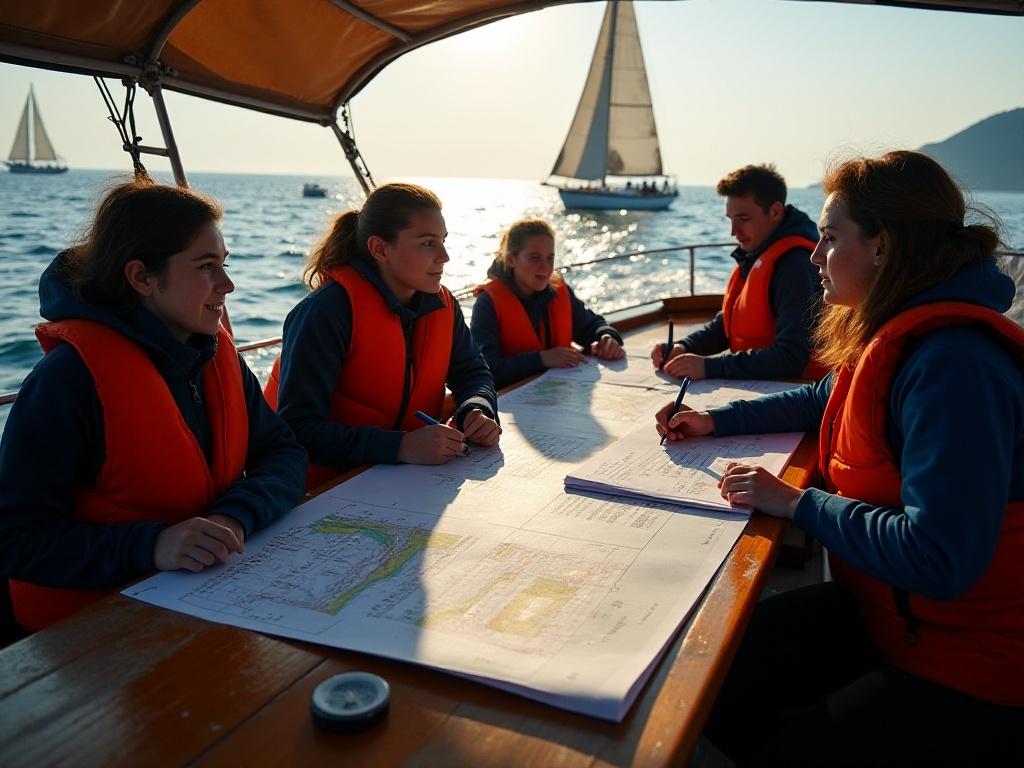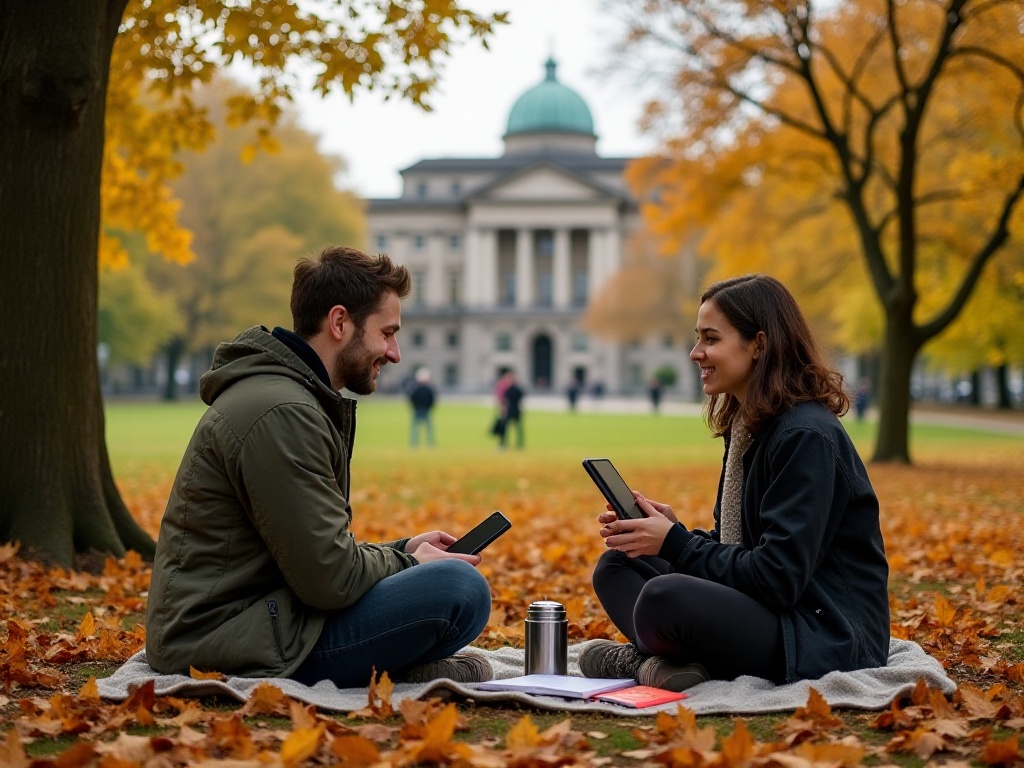
The Beginning
On a cold morning in early 2024, I stood at Capital Airport with my suitcase, feeling both nervous and excited. Finally, I was about to embark on this long-awaited journey to Germany! As someone who had been studying German for two years, I knew well what this month-long journey meant to me. This wasn't just a simple trip, but a thorough language immersion experience.
To be honest, I was quite anxious before departure. Although I had been studying German for two years, I felt my level was still at the stage of "memorizing vocabulary and doing homework." Whenever I watched German videos or news, I felt like I couldn't understand anything. But I believed that only by stepping out of my comfort zone could I achieve real progress.
Pre-trip Preparation
To maximize the benefits of this language journey, I put in considerable effort. First, I repeatedly memorized the 1000 most commonly used German words until I could recite them even when half-asleep. These words covered all aspects of daily life, from simple greetings to complex emotional expressions.
I also bought a small notebook and carefully compiled a pocket dictionary. This dictionary included not only restaurant phrases ("How would you like your hamburger cooked", "Can you add cheese to that"), but also expressions used while shopping ("Do you have this clothes in a smaller size", "Where is the fitting room"), and key sentences for asking directions ("How do I get to the train station", "Which line goes to the city center").
Besides language preparation, I downloaded offline maps of various German cities, booked bus tickets from Munich Airport to the city center, and even watched several German travel vloggers on YouTube to familiarize myself with local transportation rules and living habits. Looking back, these preparations were absolute lifesavers for my smooth living experience later.

First Arrival in Germany
I remember when I first got off the plane, all the signs at Munich Airport were in German, and the announcements were in pure German. At that moment, my heart almost stopped. Although I thought my German was decent back home, when actually facing a pure German environment, my palms were still sweating with nervousness.
My first conversation with a German person was at the immigration checkpoint. The customs officer asked about my purpose of visit in standard Bavarian accent, and I stuttered through my explanation of my travel plans. Although the process was a bit awkward, I still felt a small sense of achievement when I successfully passed the inspection.
What touched me was how friendly Germans really are. I remember at the airport bus station, when I was standing confused with my ticket, a German lady came over to help me. She not only told me the correct platform in simple German but also waited until I got on the bus before leaving. Such experiences made me realize that as long as you're willing to speak up, there will always be people willing to help.
Homestay Experience
During my month in Munich, I chose the most challenging accommodation option - a homestay family. My host family was Hans and Maria, both retired teachers. They lived in a beautiful villa in suburban Munich, with their yard full of various flowers and plants.
Hans and Maria were the most patient "German teachers" I've ever met. Every morning at breakfast, Hans would discuss newspaper news with me in German; after dinner, Maria would patiently correct the words and grammar I had misused during the day. Their teaching method was particularly interesting and pressure-free. For instance, once when I said "Ziegel" (brick) instead of "Zwiebel" (onion), Maria joked, "Do you want to put bricks in your soup?"
What touched me most was how they would design language learning activities based on my interests. After learning that I liked cooking, Maria taught me to read recipes in German, learning kitchen vocabulary while cooking. Hans would often take me to their community garden, teaching me plant names in German while trimming flowers and plants.
Every weekend, they would take me to community activities. Sometimes it was neighbors' barbecue parties, sometimes community hiking trips. During these activities, I not only practiced German speaking but also gained deep insights into German social culture. For example, at barbecue parties, everyone would take turns bringing food and drinks, a sharing tradition that particularly moved me.

Daily Practice
During my days in Munich, I treated every daily conversation as an opportunity to practice German. I remember in my first week in Germany, I deliberately avoided restaurants with Chinese menus and chose local small restaurants instead. When ordering, I often encountered unfamiliar words, but I would ask the servers to explain in German, and sometimes even learned some interesting Bavarian dialects.
Shopping was also a great language practice opportunity. German shop assistants are particularly helpful and often actively ask if you need help. I remember once when buying skincare products, the sales lady spent a full twenty minutes explaining different products' effects to me in German. Although I couldn't understand some professional terms, I could basically understand her meaning through her gestures and expressions.
On public transportation, I also created many practice opportunities. Once when I took the wrong subway direction, I gathered courage to ask an elderly gentleman for directions. This gentleman not only gave me detailed correct directions but also shared his experience of working in China when he was young. Thus, a simple request for directions turned into a pleasant cross-cultural exchange.
I also discovered that Germans particularly enjoy chatting while waiting. Whether queuing at the bakery or waiting at the post office, you can hear people around you chatting. Gradually, I learned to join their conversations. Although I could only say simple sentences at first, through constant practice, my speaking ability improved significantly without me realizing it.
Cultural Immersion
To truly master a language, being able to speak is not enough; it's more important to understand the culture behind the language. During my days in Germany, I created a "cultural immersion plan" for myself every day.
After waking up, I would listen to news programs on German radio stations. Although it was difficult to understand at first, through daily persistence, I gradually could understand the main content. During lunch breaks, I liked to read German newspapers in cafes. Germany has many types of newspapers, from the serious Süddeutsche Zeitung to the popular Bild. I particularly enjoyed reading the sports and culture sections because these sections use relatively simple language and have interesting content.
In the evenings back home, I would watch German TV programs with my host family. German TV programs are particularly rich, ranging from news magazines to talk shows, from documentaries to soap operas. I especially liked watching a police drama called "Tatort" because it had many life-like dialogues, and the subtitles were also in German, particularly suitable for learning.
On weekends, I often went to museums and art galleries. Many museums in Munich offer German guided tours. My favorite was the German Museum, which not only had detailed German explanations, but the guides would also vividly introduce Germany's history of technological development. Although I sometimes encountered unfamiliar technical terms, through repeated inquiry and recording, my vocabulary expanded significantly.

Social Circle
In Munich, I discovered a fantastic language exchange activity. Every Tuesday evening, language learners from around the world would gather at a beer garden near the Englischer Garten. This activity was completely free; you just needed to buy a beer to participate.
There, I met friends from France, Spain, Italy, and other countries. Everyone communicated in German, discussing their respective national cultures, study abroad experiences, and work experiences. The most impressive was a girl from Brazil who had lived in Germany for three years and spoke German particularly well. She told me that the most important thing in learning a language is to stay relaxed and treat mistakes as steps toward progress.
Besides regular language exchange activities, I also joined some interest groups. For example, the Thursday football club - although my football skills were average, shouting German cheering phrases on the field was particularly exciting. There were also weekend cooking classes where we studied traditional German recipes in German with other students, improving both culinary skills and language abilities simultaneously.
Unexpected Gains
During my days in Munich, I discovered that being able to speak German could bring many unexpected rewards. One day, while wandering in the old town, I met an elderly gentleman who was closing his shop. Chatting with him in German, I learned that this was a traditional bakery that had been open for nearly 150 years.
This shop was hidden in a deep alley and didn't advertise at all, but locals all knew that their rye bread was the best in Munich. The elderly gentleman was the fourth-generation owner, and he told me that since the shop opened in 1876, their bread-making technique had never changed. He particularly enjoyed chatting with customers, but because he only spoke German, few tourists could discover this shop's special qualities.
Through this chance encounter, I not only tasted the most authentic Bavarian bread but also heard many old stories about Munich from the elderly gentleman. For example, during World War II, this bakery was a secret contact point for the underground resistance movement, and the basement still retains traces from that time. Without speaking German, I probably would never have heard these stories.

Data Speaks
One month of language environment immersion brought me significant progress. Before leaving Germany, I took a German proficiency test at the Goethe-Institut in Munich. The results showed that my German level had improved from A2 before departure to B1 level. Specifically, my listening comprehension ability improved by about 65%, speaking fluency improved by 60%, and vocabulary increased by more than 800 words.
Such progress speed might take half a year or even longer in regular classroom learning. What delighted me most was that I could now comfortably handle various daily life situations in German, such as making doctor's appointments, handling bank business, and viewing apartments for rent. These things, which I wouldn't have dared to imagine before departure, now became easy.
The test teacher particularly praised my speaking ability, saying my pronunciation and intonation were very natural, unlike many language learners who sound stiff. I think this might be due to daily real communication with Germans; through constant practice, my pronunciation and language sense improved significantly.

Experience Summary
Looking back at this month's experience, I think the key to successfully improving language level lies in the following points:
First, don't be afraid of making mistakes. I remember when I first arrived in Germany, I was always worried about being laughed at for speaking incorrectly, repeatedly pondering in my mind before speaking. Later I discovered that Germans actually understand foreigners' difficulties in speaking German, and they care more about whether you're willing to communicate in German rather than whether your grammar is completely correct.
Second, actively create opportunities to speak German. The biggest advantage of studying a language abroad is that you can find practice opportunities at any time. Even simple greetings, if practiced daily, can help improve your speaking ability. My experience is to treat every opportunity to communicate with people as practice for improving language ability.
Finally, immerse yourself in the German environment as much as possible. This means not only speaking more German but also listening, reading, and writing more. While in Germany, I basically didn't look at Chinese media, and even changed my phone system to German. Although such comprehensive immersion might be uncomfortable at first, the effects are indeed obvious.

New Starting Point
This trip to Germany gave me a completely new understanding of language learning. I discovered that language learning isn't just about memorizing vocabulary and doing exercises; more importantly, it's about understanding a country's culture and humanities through language.
Now I'm full of confidence to continue learning German, and I've already started planning next year's in-depth tour of Germany. I plan to live in Germany for half a year, properly experience life in different cities, and further improve my German level.
Through this experience, I deeply realized that only by completely immersing yourself in the target language environment can you truly master a language. Language isn't for learning, but for communication. Only in real communication can we truly understand the essence of a language.
Next
Learning Languages in Foreign Lands: An Immersive Experience Shared by a Travel Blogger
Explore the dynamic relationship between travel and language learning, examining how immersion enhances language skills and how linguistic abilities deepen travel experiences through cultural engagement and authentic interactions
One Person's Language Journey: Measuring the World with Footsteps, Making Travel the Best Language Classroom
Explore effective methods and benefits of learning languages through travel, combining immersive strategies with practical approaches, supported by digital tools and structured resources for enhanced language acquisition and personal growth
One Person's Language Learning Journey: My 90-Day Immersion Experience in a Rural Japanese Town
Explore how travel facilitates language learning through immersive environments, covering natural and structured learning methods, along with guidance on choosing suitable language programs and courses to enhance language skills while traveling
Next

Learning Languages in Foreign Lands: An Immersive Experience Shared by a Travel Blogger
Explore the dynamic relationship between travel and language learning, examining how immersion enhances language skills and how linguistic abilities deepen travel experiences through cultural engagement and authentic interactions

One Person's Language Journey: Measuring the World with Footsteps, Making Travel the Best Language Classroom
Explore effective methods and benefits of learning languages through travel, combining immersive strategies with practical approaches, supported by digital tools and structured resources for enhanced language acquisition and personal growth

One Person's Language Learning Journey: My 90-Day Immersion Experience in a Rural Japanese Town
Explore how travel facilitates language learning through immersive environments, covering natural and structured learning methods, along with guidance on choosing suitable language programs and courses to enhance language skills while traveling



